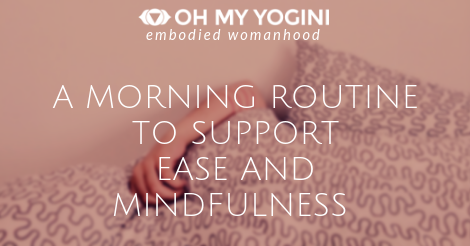I was asked about my own mindfulness practices recently and as I reflected it occurred to me how (over time) I had built a simple and easy routine into my everyday - in a flexible, forgiving and uncomplicated way.
This is despite a mutli-million dollar wellness industry constantly promoting consumption and ‘things’ to support your emotional, mental and physical wellbeing - but I promise you that it is a routine that works for you, not against you, and won’t cost a penny!
In fact, I dare say that the MOST effective mindful, meditative, calming moments are those that are no fuss because they are directly accessible.
After all, how are we supposed to find relief and relaxation if it requires hours of preparation, ideal conditions, half a dozen environmental adjustments, including a perfectly tidy bedroom/home and complete privacy for three hours! #nothappening
To eventually reach a sense of “no-fuss flow” with your mindful practices, it might still require a little effort in the beginning, but eventually we rewire ourselves (muscle memory and neurological pathways) through persistence with habit so that it becomes easier and quicker to “slip in” to that space of mindful awareness.
Here are 5 morning mindful practices that are a go-to for me:
Upon waking I do a quick (30 seconds up to a minute or two) bodyscan while I still lay in my bed. I’m simply checking in, with how I feel: am I tired, are any parts of my body cranky/stiff, how do I feel about the day ahead? No judgement on the responses, just inquiry and self reflection before I do absolutely anything. I might also have a think about what I’m looking forward to or am grateful for during the day ahead.
I move my body. This can take any form: free-styling to a three-minute song; a 20-60 minute walk; a few minutes mindful flow on my yoga mat or on top of the bed. Whatever method I am choosing I intended to be present and to literally feel myself, my flesh, bones and what’s happening in my body and encouraging blood oxygenation through movement and breath. All of which is physiologically and mentally healthful.
It’s often a challenge - but equally incredibly rewarding - to then go straight into 20-30 minutes (3 x A4 page) stream of consciousness writing. This also provides some space and time for me and me alone, before the stresses of the day and the wider world crowd in. On the page and in the process, there is no intermediary, just a conversation or channeling of my mind’s ramblings. It’s very cathartic and super effective for getting the ‘inner critic’ out before I go about my life and work for the day.
I then make a warm lemon water (NB this could be step 3, so that I drink and write simultaneously). Lemons are alkalising and so very good as the first thing to rehydrate the body, and support the digestive system after sleeping. It gives me an immediate sense of self-care and mindfulness for my whole mindbody system. This one step alone offers me a sense of achievement on those days when things feel particularly hard.
Finding mindfulness in my daily commute is another opportunity to be present, and - surprisingly- deeply meditative. I like to let my mind be free of thinking sometimes and so resist the podcast or anything that requires mental processing. Instead I opt for sounds that create softness, ease and calm if you’re on public transport or in a vehicle. I recommend a playlist on Spotify (try my 40 Days of Devotion playlist HERE), or the beautiful ambient sounds from Tahlee Rouillon of Sonesence (find her beautiful Meditones HERE). Keeping sensory stimulation to a minimum through music and meditones is my favourite way to manage stress levels during commutes, and of course there is the wonderful natural high and endorphins the right aural ambience can bring. If you are on a walk or bike - or need all your wits about you - instead try bringing your attention and focus to the natural world around you; sky, earth, tress while you move from A to B.
Have you noticed a theme in the suggestions above?
Essentially, the easiest moments to access mindfulness are in the everyday, familiar when our brain can go into autopilot. We can then do ‘a thing’ without thinking and then create a moment to direct our attentions back to our body, our breathing or the actual process we are in.
In this way, I actually LOVE doing the dishes. It might just be the most meditative part of my day as I come in close to observe the soap suds, the movement of the sponge over the dishes and the water as it rinses them clean… Just don't ask me to dry them!
As you begin to take steps towards greater mindfulness in your everyday, ensure you give yourself credit. You are after all building a new muscle, of observation and intention for greater awareness of yourself, how you’re feeling, and what might be arising in that moment.
The small act of self-recognition and compassion for your intentions and actions is as important as the practice itself.
If we diminish or ignore our efforts, as though they don’t count or aren’t important to the process, we are overlooking ourselves, our abilities and all the parts that make the puzzle whole and complete.
I hope this is a helpful starting point, but make sure to find what works best for you.
I’d love to hear about any mindfulness hacks you might already practice in your life!?





